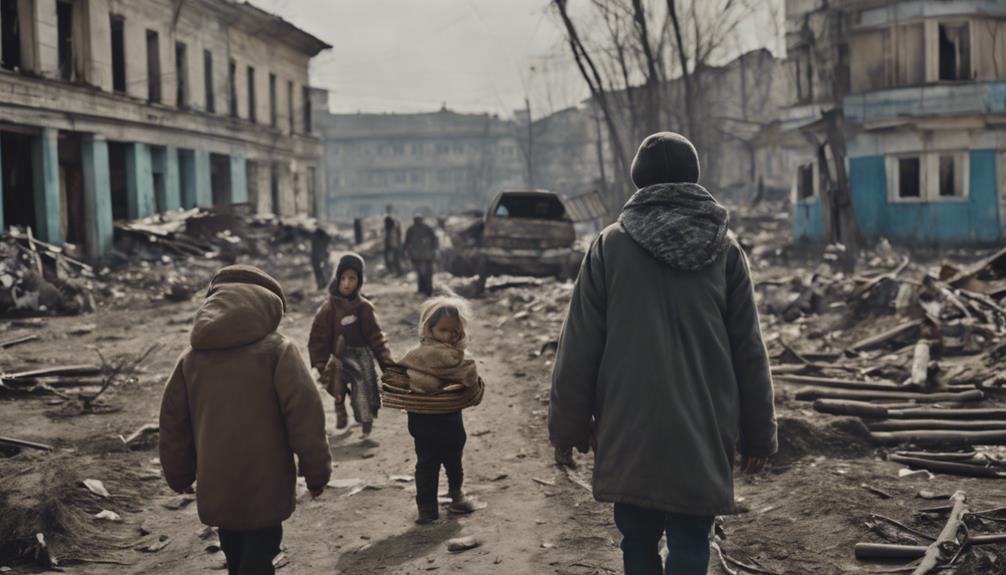The conflict in Ukraine has triggered a chain reaction affecting the world's poorest and most vulnerable. Rising prices have pushed 71 million people into poverty, with the global poverty rate hitting 9.2% by April 2023. Vulnerable communities face disproportionate food crises due to supply chain disruptions. Urgent international aid is vital to alleviate these repercussions. Blocked ports in Ukraine and Russia are causing global supply chain challenges, impacting low-income countries like Burkina Faso and Kenya. Essential goods are becoming scarce, necessitating resilience planning. The interconnectedness of global supply chains underscores the need for immediate action to address growing challenges.
Key Takeaways
- Rising prices from Ukraine conflict deepen poverty for 71 million.
- Global poverty rate hits 9.2% by April 2023.
- Vulnerable communities disproportionately affected by food crisis.
- Supply chain disruptions worsen challenges for struggling individuals.
- Urgent international aid needed to alleviate crisis repercussions.
Impact of Rising Prices on Poverty
Rising prices driven by the Ukraine conflict swiftly plunged 71 million people worldwide into poverty within three months of the invasion. The war's ripple effects on the global economy led to a surge in food prices, triggering a widespread food crisis that disproportionately affected the poorest populations.
As a result, the global poverty rate soared to 9.2% by April 2023, highlighting the severe impact of the conflict on vulnerable communities. The escalation in food prices, exacerbated by the disruptions in supply chains, created significant challenges for individuals already struggling to make ends meet.
The direct correlation between the Ukraine conflict and the spike in poverty rates underscores the urgent need for international aid and support to mitigate the repercussions of the crisis. While the conflict's primary theater may be in Eastern Europe, its repercussions have reverberated across continents, amplifying economic hardships for millions of people around the world.
Disruptions in Supply Chains

Supply chains around the world are facing significant challenges due to the disruptions caused by blocked ports in Ukraine and Russia. The global market is feeling the impact of these disruptions, with low-income countries like Burkina Faso and Kenya being particularly vulnerable to the economic repercussions.
As Russian attacks continue to affect grain storage and fertilizer production, the reliance on Ukrainian wheat is leading to shortages in regions already facing food insecurity, further exacerbating the situation for the world's poorest populations.
Supply Chain Challenges
Amid the ongoing conflict in Ukraine, the global supply chains are experiencing significant disruptions, impacting the availability of essential goods worldwide.
The war has caused disruptions in global food supply chains, leading to shortages and delays in transporting goods. Ports in Ukraine and Russia, important transit points for goods, have been affected, causing ripple effects throughout the supply chain network.
These disruptions haven't only increased transportation costs but also made it challenging for companies to source raw materials and components necessary for production. The global food supply chain, in particular, has been hit hard, highlighting the interconnected nature of supply chains and the need for resilience planning.
The Ukraine effect serves as a stark reminder of the vulnerabilities present in the global supply chain system, urging companies to reevaluate their strategies and enhance their preparedness for unforeseen disruptions in the future.
Global Market Impact
The war in Ukraine has sent shockwaves through global markets, causing widespread disruptions in supply chains. These disruptions have had a significant impact on various sectors, leading to shortages in essential commodities like wheat and energy. As a result, global markets have experienced increased prices and volatility, creating ripple effects that are felt worldwide. Vulnerable populations, particularly in low-income countries, are facing heightened food and energy insecurity due to these disruptions. This has further exacerbated economic challenges for nations reliant on Ukrainian and Russian exports.
| Global Market Impact | |
|---|---|
| Impact | Disruptions in supply chains |
| Ripple Effects | Shortages of essential commodities |
| Global Markets | Increased prices and volatility |
| Food Insecurity | Vulnerable populations affected |
| Economic Challenges | Low-income countries hit hardest |
Economic Repercussions
With the global economy already grappling with the aftermath of the Ukraine conflict, disruptions in supply chains have triggered widespread economic repercussions on a global scale. These disruptions have had a significant economic impact, especially on vulnerable populations who are most reliant on stable supply chains for essential goods. The global repercussions of these supply chain disruptions are becoming increasingly apparent as shortages and price increases in essential items are felt worldwide.
- Essential goods such as food, medicine, and fuel are facing shortages due to disrupted supply chains, impacting the most vulnerable populations who depend on these items for their daily needs.
- Vulnerable populations, including low-income families and individuals in developing countries, are bearing the brunt of the economic impact caused by supply chain disruptions, exacerbating their already precarious situations.
- Efforts to stabilize supply chains and ensure the smooth flow of essential goods are pivotal in mitigating the economic repercussions on vulnerable populations and preventing further hardships for those most in need.
Shortages and Increased Costs

Shortages of essential commodities like wheat from Ukraine and Russia have triggered a domino effect of increased food prices worldwide.
The ripple effects are being felt most acutely in low-income nations that heavily rely on Ukrainian and Russian wheat, exacerbating food insecurity risks.
The conflict-induced disruption in grain storage and fertilizer production has compounded the challenges, illustrating the interconnectedness of global supply chains in the face of crises.
Supply Chain Disruptions
Amidst the global repercussions of the Ukraine conflict, supply chain disruptions have caused essential goods to become scarce and prices to surge, impacting vulnerable populations worldwide.
Here are three key impacts of these disruptions:
- Shortages: The war in Ukraine has disrupted critical supply chains, leading to shortages of key commodities like wheat, fuel, and fertilizers. These shortages have made it challenging for vulnerable populations to access necessary goods, further exacerbating their already precarious situations.
- Increased Costs: The disruptions have resulted in increased transportation costs and trade disruptions, causing the prices of essential goods to skyrocket. This surge in costs is particularly detrimental to vulnerable populations in low-income countries, who may struggle to afford basic necessities as a result.
- Global Impact: The ripple effects of these supply chain disruptions are being felt globally, highlighting the interconnected nature of the world economy. As essential goods become scarcer and more expensive, vulnerable populations around the world face heightened challenges in meeting their basic needs.
Food Insecurity Risks
The disruption in global food supplies due to the conflict between Ukraine and Russia is heightening food insecurity risks for vulnerable populations worldwide, with shortages and increased costs looming as significant threats.
The ongoing conflict has led to a food crisis, particularly affecting vulnerable households in developing countries reliant on Ukrainian and Russian food exports. Rising food prices, stemming from the disrupted food supplies, are pushing many families to the brink of hunger.
The global food insecurity, exacerbated by the war-induced food crisis, poses severe challenges for those already struggling to access an adequate diet. Russian attacks on grain storage facilities have further compounded the situation, intensifying the struggles faced by millions.
The consequences of this crisis are dire, with the most vulnerable populations bearing the brunt of these challenges. As the conflict continues, the outlook for those already grappling with food insecurity remains bleak, highlighting the urgent need for international support and coordinated efforts to address this escalating crisis.
Global Cooperation for Relief Efforts

Effective relief efforts in response to the Ukraine conflict require strong global cooperation among nations to address the humanitarian crisis affecting the most vulnerable populations. This cooperation is essential for ensuring timely and coordinated actions to alleviate food and medical aid shortages in conflict-affected regions. Collaborative efforts are needed to facilitate the safe displacement and resettlement of civilians impacted by the Ukraine effect. International response efforts play a pivotal role in providing support and resources to those most in need.
- Coordinated Aid Delivery: Global cooperation enables the efficient and effective delivery of essential aid such as food, medical supplies, and shelter to vulnerable populations in crisis-affected areas.
- Resource Sharing: Nations working together can pool resources and expertise to maximize the impact of relief efforts, ensuring that assistance reaches those facing the most dire circumstances.
- Information Exchange: Collaborative efforts foster information sharing on the evolving needs of affected communities, enabling swift responses and targeted interventions to address emerging challenges.
Targeted Interventions for Vulnerable Communities

To effectively mitigate the impact of the Ukraine conflict on the world's most vulnerable populations, targeted interventions are essential in providing timely assistance where it's needed most. In the context of the war-induced crisis, targeted cash transfers have shown to be particularly beneficial for the poorest 40% of the population, ensuring that aid reaches those who are most in need. This approach contrasts with energy subsidies, which tend to primarily benefit wealthier individuals. By focusing on cash transfers, interventions become more equitable and directly address the vulnerabilities faced by marginalized communities.
Additionally, the proposal for a two-year debt moratorium offers a lifeline to developing countries affected by the Ukraine effect. This initiative aims to alleviate the economic strain caused by the crisis, especially in vulnerable communities that are already grappling with food and energy shortages. Through targeted interventions like cash transfers and debt relief, support can be channeled effectively to those who are bearing the brunt of the conflict's repercussions.
Alleviating Economic Struggles

Alleviating economic hardships through targeted measures remains paramount in addressing the fallout from the Ukraine conflict on vulnerable populations. To tackle the economic challenges exacerbated by the conflict, specific steps need to be taken:
- Cash transfers: Prioritizing cash transfers over energy subsidies can directly benefit the poorest 40% of the population, offering them much-needed financial assistance in times of crisis.
- Energy subsidies: While energy subsidies have their place, they mainly benefit wealthier individuals. Redirecting these funds towards cash transfers can guarantee that those most in need receive support.
- Debt moratorium: Implementing a two-year debt moratorium for all developing countries struggling economically can provide breathing room and alleviate the financial strain caused by the Ukraine conflict. This measure aims to stabilize economies and prevent further deterioration in living conditions for vulnerable populations.
Crisis Exacerbation in Developing Nations

The escalating crisis in developing nations due to rising food and energy prices post-invasion is amplifying life-threatening conditions for vulnerable populations. Low-income countries heavily reliant on Russian and Ukrainian wheat are facing shortages, directly impacting vulnerable communities. These nations, such as Burkina Faso and Kenya, are experiencing the repercussions of blocked ports due to the conflict, hindering the flow of essential goods.
Additionally, the spike in fossil fuel prices post-invasion has resulted in increased household energy costs in countries like Rwanda, further straining already limited resources for the most vulnerable. The significant decrease in grain and oilseed exports from Ukraine is also contributing to concerns about global food security, affecting developing nations that rely on these imports.
As these crises compound, the need for immediate action to address the growing challenges faced by vulnerable populations in developing nations becomes increasingly urgent.
Importance of Immediate Action

The mounting challenges faced by vulnerable populations in developing nations post-invasion underscore the critical need for immediate action to alleviate worsening conditions caused by the Ukraine crisis. Immediate action is paramount for several reasons:
- Rising Poverty Levels: 71 million people globally fell into poverty within three months of the conflict, with the extreme poverty rate reaching 9.2% by April 2023, emphasizing the urgency for assistance.
- Impact on Vulnerable Households: Energy costs have doubled worldwide due to soaring fuel prices, disproportionately affecting vulnerable households and exacerbating their already precarious situations.
- Global Cooperation for Crisis Mitigation: The consequences of the war are far-reaching, affecting regions such as Africa, Asia, Eastern Europe, and the Middle East. Global cooperation is essential to stabilize living conditions and address the food and energy crisis promptly, requiring immediate collaborative efforts on an international scale.
Frequently Asked Questions
How Has the Ukraine War Affected the Global Economy?
The Ukraine war has greatly impacted the global economy. Energy costs doubled, leading to a rise in fuel prices worldwide. This increase has put pressure on various sectors and led to inflationary concerns.
The disruption in global food and energy markets has created challenges for businesses and consumers alike. The war's effects have reverberated across different regions, causing instability and economic strain.
The ongoing conflict continues to have far-reaching consequences on the world economy.
How Does the Russian Ukraine War Affect Developing Countries?
The Russian-Ukraine war impacts developing countries by disrupting food and energy supply chains, leading to shortages and price hikes. These nations, reliant on Russian and Ukrainian exports, face challenges as blocked ports hinder wheat and energy resource imports.
The conflict escalates fossil fuel prices, exacerbating vulnerabilities in low-income populations. This crisis has rapidly increased poverty rates, pushing 71 million people worldwide into impoverishment.
The global economy's interconnectedness magnifies the ripple effects of this war on developing nations.
What Are the Effects of the Conflict in Ukraine?
The conflict in Ukraine has far-reaching effects on global food security. With Ukraine and Russia exporting a significant portion of the world's wheat, ongoing hostilities could lead to a potential 20% increase in food prices worldwide.
This impacts countries like Somalia, heavily reliant on wheat imports, and jeopardizes food aid programs by organizations like the World Food Programme. The situation highlights the vulnerability of approximately 44 million people in 38 countries facing famine.
How Does War Affect the Poor?
War greatly impacts the poor by disrupting livelihoods, increasing economic instability, and leading to conflict-induced inflation. This results in higher prices for essential goods, particularly affecting low-income households.
Additionally, displacement due to war causes the loss of homes, jobs, and access to basic services, further marginalizing vulnerable populations. Limited access to food, healthcare, and education exacerbates the challenges faced by the poor during times of conflict.
Conclusion
To sum up, the Ukraine crisis has had a significant impact on the world's poorest and most vulnerable populations. Rising prices, disruptions in supply chains, and shortages have exacerbated poverty and economic struggles in developing nations.
Immediate global cooperation and targeted interventions are essential to alleviate the crisis and prevent further harm to those in need. It's imperative that action be taken swiftly to address the challenges faced by the most vulnerable communities around the world.










